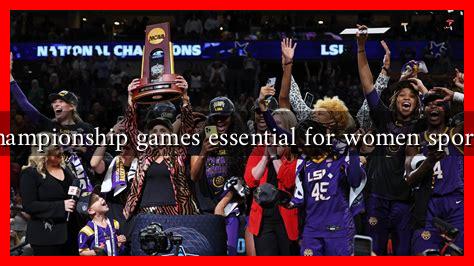-
Table of Contents
Why Championship Games Are Essential for Women’s Sports Visibility
In recent years, the visibility of women’s sports has gained significant traction, yet there remains a long way to go in achieving parity with men’s sports. Championship games play a crucial role in this visibility, serving as a platform to showcase female athletes, inspire future generations, and promote gender equality in sports. This article explores the importance of championship games in enhancing the visibility of women’s sports, supported by relevant examples and statistics.
The Power of Championship Games
Championship games are the pinnacle of any sports season, drawing in large audiences and media attention. For women’s sports, these events are particularly vital for several reasons:
- Increased Media Coverage: Championship games often receive extensive media coverage, which is essential for promoting women’s sports. For instance, the 2021 NCAA Women’s Basketball Championship attracted over 4 million viewers, a significant increase from previous years.
- Role Models for Young Athletes: High-stakes games feature elite athletes who serve as role models for young girls. The visibility of these athletes can inspire the next generation to pursue sports, as seen with players like Serena Williams and Megan Rapinoe.
- Commercial Opportunities: Championship games attract sponsors and advertisers, leading to increased funding for women’s sports programs. This financial support is crucial for the growth and sustainability of women’s athletics.
Case Studies: Success Stories in Women’s Sports
Several championship events have significantly impacted the visibility of women’s sports, showcasing the potential for growth and recognition.
The FIFA Women’s World Cup
The FIFA Women’s World Cup is one of the most significant events in women’s sports. The 2019 tournament in France set records with over 1.12 billion viewers worldwide. The U.S. Women’s National Team’s victory not only highlighted their athletic prowess but also sparked conversations about equal pay and investment in women’s sports. The visibility gained from such events has led to:
- Increased participation in women’s soccer at the grassroots level.
- Greater media coverage of women’s soccer leagues.
- Enhanced sponsorship deals for female athletes and teams.
The WNBA Finals
The Women’s National Basketball Association (WNBA) has also made strides in visibility through its championship games. The 2021 WNBA Finals saw a 51% increase in viewership compared to the previous year, showcasing the growing interest in women’s basketball. The league has successfully leveraged its championship games to:
- Highlight the skills and athleticism of female players.
- Engage fans through social media and community events.
- Attract high-profile endorsements and partnerships.
The Role of Social Media and Technology
In today’s digital age, social media and technology play a pivotal role in promoting women’s sports. Championship games are often trending topics on platforms like Twitter and Instagram, allowing fans to engage with the events in real-time. This engagement can lead to:
- Increased fan interaction and community building.
- Wider reach beyond traditional media outlets.
- Opportunities for athletes to share their stories and connect with fans.
Challenges and the Path Forward
Despite the progress made, challenges remain in achieving equal visibility for women’s sports. Issues such as unequal pay, lack of media coverage, and limited sponsorship opportunities persist. To overcome these challenges, stakeholders must:
- Advocate for equal pay and resources for female athletes.
- Encourage media outlets to prioritize coverage of women’s sports.
- Support grassroots initiatives that promote female participation in sports.
Conclusion
Championship games are essential for enhancing the visibility of women’s sports, providing a platform for female athletes to shine and inspire future generations. As we continue to witness the growth of women’s sports, it is crucial to support these events and advocate for greater equality in the sports industry. By doing so, we can ensure that women’s sports receive the recognition and respect they deserve, paving the way for a more inclusive future in athletics.
For more information on the impact of women’s sports, visit Women’s Sports Foundation.

